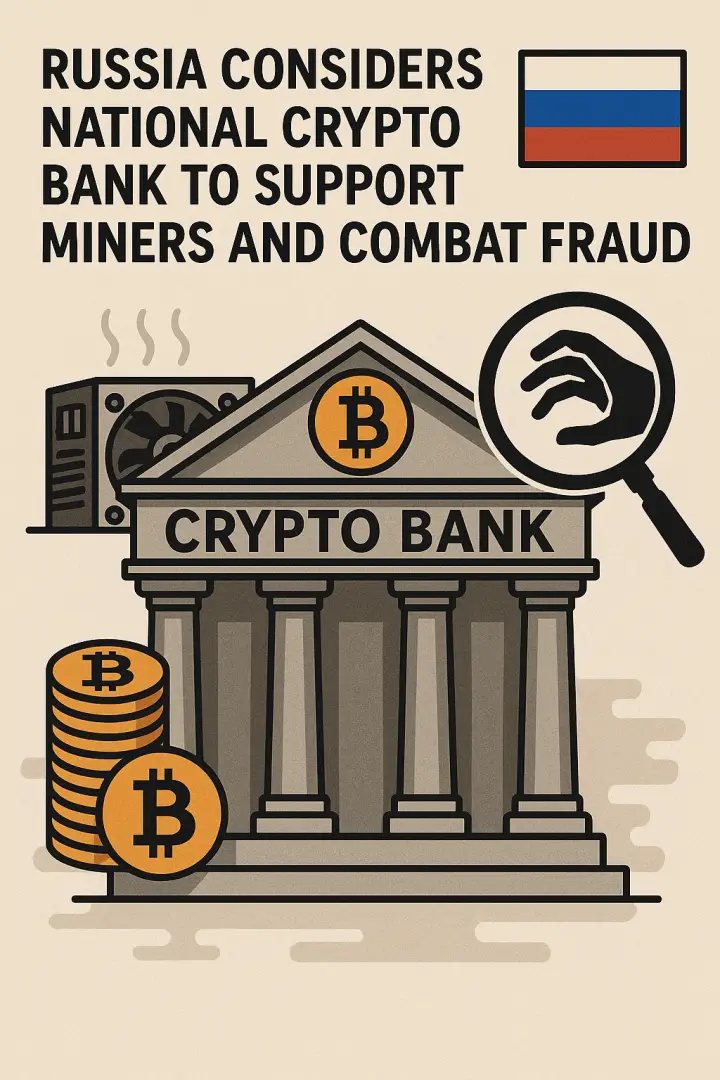
Russia Considers National Crypto Bank to Support Miners and Combat Fraud
The Russian government is reportedly weighing the creation of a Russia national crypto bank to regulate, secure, and oversee the country’s fast-growing digital asset sector. The proposal comes amid rising concerns about illicit transactions, fraud, and the need for structured support for the mining industry.
Why Russia Wants a National Crypto Bank
Crypto adoption in Russia has surged in recent years, fueled by both retail and institutional interest. However, unregulated activity has also led to:
- Increased fraud cases involving fake exchanges and scams.
- Mining inefficiencies, with energy-heavy operations lacking coordinated support.
- Capital flight risks, as funds move through offshore platforms.
By centralizing oversight, the proposed crypto bank could ensure transparent settlement of transactions while offering miners institutional-grade services.
Crypto Mining Support in Focus
Russia is one of the largest Bitcoin mining hubs globally, thanks to its vast energy resources and cheap electricity. Yet, the lack of structured financial services has left many miners dependent on informal channels.
A national crypto bank could:
- Offer credit and liquidity lines for miners.
- Ensure energy consumption monitoring and compliance with government quotas.
- Streamline tax and revenue reporting for the mining industry.
This move aligns with Russia’s strategy to leverage mining as a revenue source while maintaining national control over the industry.
Tackling Fraud and Illicit Transactions
Fraud remains a pressing issue in Russia’s crypto market. By establishing a regulated institution, authorities could:
- Authenticate wallets and transactions under a unified framework.
- Provide KYC/AML-compliant onramps for individuals and businesses.
- Reduce the appeal of using unlicensed offshore exchanges.
A national crypto bank could function much like a clearinghouse, giving regulators greater visibility into flows of capital without banning digital assets outright.
Global Context: Russia vs. Other Nations
Russia is not alone in exploring centralized crypto oversight:
- China has developed its own digital yuan and banned private crypto activity.
- Kazakhstan recently introduced stricter mining licenses.
- The U.S. and EU are expanding regulatory oversight while allowing innovation in tokenization and DeFi.
If launched, Russia’s national crypto bank would represent a middle path — not banning cryptocurrencies but ensuring state-managed compliance.
Implications for the Market
The potential launch of a Russia national crypto bank could have several ripple effects:
- For miners: Greater access to capital and regulatory certainty.
- For investors: More transparency but possibly stricter rules on usage.
- For global markets: Signals that governments are willing to create hybrid systems, merging blockchain with centralized finance.
With energy revenues already under strain due to sanctions, tapping into regulated crypto mining could provide Russia with a new revenue stream.
Final Takeaway
Russia’s consideration of a national crypto bank highlights its dual strategy: promoting mining as a state-supported industry while tightening control to curb fraud. If implemented, the move could reshape how digital assets are integrated into the Russian economy — and provide a blueprint for other nations balancing innovation with regulation.














